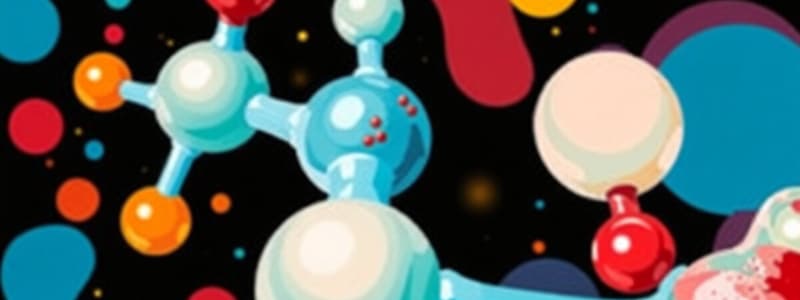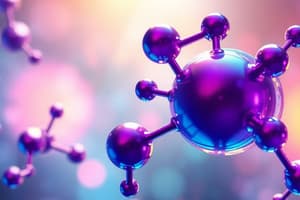Podcast
Questions and Answers
What structural feature differentiates a phospholipid from a triglyceride?
What structural feature differentiates a phospholipid from a triglyceride?
- Phospholipids have a polar 'head' and two fatty acid 'tails'. (correct)
- Phospholipids have three fatty acids.
- Triglycerides contain a phosphate group.
- Triglycerides have a ring structure.
Why can fatty acids with double bonds not pack together tightly?
Why can fatty acids with double bonds not pack together tightly?
- They have a branched structure.
- The presence of carbon–carbon double bonds creates kinks. (correct)
- They lack nonpolar tails.
- They are too large in size.
What is a primary function of cholesterol in the body?
What is a primary function of cholesterol in the body?
- It acts as a primary energy source.
- It is used to make steroid hormones. (correct)
- It aids in digestion as an enzyme.
- It is responsible for transporting oxygen.
Which part of the phospholipid is hydrophilic?
Which part of the phospholipid is hydrophilic?
Which of the following statements about proteins is correct?
Which of the following statements about proteins is correct?
What are steroid hormones primarily derived from?
What are steroid hormones primarily derived from?
How many amino acids are commonly found in proteins?
How many amino acids are commonly found in proteins?
In what cellular structure are phospholipids primarily found?
In what cellular structure are phospholipids primarily found?
How many different amino acids can your body synthesize?
How many different amino acids can your body synthesize?
What is the term for the covalent bonds that link amino acids together?
What is the term for the covalent bonds that link amino acids together?
Which part of the amino acid structure is different for each amino acid?
Which part of the amino acid structure is different for each amino acid?
What is formed when multiple amino acids are linked by peptide bonds?
What is formed when multiple amino acids are linked by peptide bonds?
Which of the following elements is NOT commonly found in amino acids?
Which of the following elements is NOT commonly found in amino acids?
What determines the primary structure of a protein?
What determines the primary structure of a protein?
Which of the following correctly describes the components attached to the central carbon of an amino acid?
Which of the following correctly describes the components attached to the central carbon of an amino acid?
What role do foods like meat, beans, and nuts serve in relation to amino acids?
What role do foods like meat, beans, and nuts serve in relation to amino acids?
What determines a protein’s structure and function?
What determines a protein’s structure and function?
What type of bond can form between sulfur-containing side groups of amino acids?
What type of bond can form between sulfur-containing side groups of amino acids?
How does the improper sequence of amino acids affect protein function?
How does the improper sequence of amino acids affect protein function?
What is the consequence of just one wrong amino acid in hemoglobin?
What is the consequence of just one wrong amino acid in hemoglobin?
What are nucleic acids primarily composed of?
What are nucleic acids primarily composed of?
Which component is NOT part of a nucleotide?
Which component is NOT part of a nucleotide?
What is the role of iron atoms in hemoglobin?
What is the role of iron atoms in hemoglobin?
What happens to a protein if its amino acid sequence is altered incorrectly?
What happens to a protein if its amino acid sequence is altered incorrectly?
What are the two general types of nucleic acids?
What are the two general types of nucleic acids?
What is the primary function of DNA?
What is the primary function of DNA?
How does RNA assist in protein synthesis?
How does RNA assist in protein synthesis?
In what way can RNA molecules differ in function compared to DNA?
In what way can RNA molecules differ in function compared to DNA?
What monomers make up nucleic acids?
What monomers make up nucleic acids?
What aspect of DNA allows it to provide the proper assembly code for proteins?
What aspect of DNA allows it to provide the proper assembly code for proteins?
What role does the arrangement of nucleotides in DNA play?
What role does the arrangement of nucleotides in DNA play?
Which of the following statements about nucleic acids is incorrect?
Which of the following statements about nucleic acids is incorrect?
What unique property of carbon atoms allows them to form various carbon-based molecules?
What unique property of carbon atoms allows them to form various carbon-based molecules?
Which of the following is NOT a main type of carbon-based molecule found in living things?
Which of the following is NOT a main type of carbon-based molecule found in living things?
What structure types can carbon-based molecules form?
What structure types can carbon-based molecules form?
How many other atoms can a single carbon atom bond with simultaneously?
How many other atoms can a single carbon atom bond with simultaneously?
What key role do carbon-based molecules play in living organisms?
What key role do carbon-based molecules play in living organisms?
Which statement best describes the variety of carbon-based molecules?
Which statement best describes the variety of carbon-based molecules?
What analogy is used to describe the relationship between carbon-based molecules?
What analogy is used to describe the relationship between carbon-based molecules?
Why is carbon often referred to as the building block of life?
Why is carbon often referred to as the building block of life?
Study Notes
Carbon-Based Molecules Overview
- Carbon atoms serve as the foundation of life, forming the backbone of most biomolecules.
- Unique bonding properties of carbon enable it to form covalent bonds with up to four other atoms.
Types of Carbon-Based Molecules
- Four main types: carbohydrates, lipids, proteins, and nucleic acids.
- Carbon-based molecules can form diverse structures including straight chains, branched chains, and rings.
Lipids
- Major component of cell membranes, primarily made up of phospholipids.
- Phospholipid structure: consists of glycerol, two fatty acids (nonpolar "tails"), and a phosphate group (polar "head").
- Triglycerides: formed from three fatty acids and glycerol, lacking a phosphate group.
- Cholesterol: a lipid with a ring structure, essential for cell membranes and the production of steroid hormones (e.g., testosterone and estrogen).
Proteins
- Most diverse type of carbon-based molecule.
- Composed of monomers called amino acids, which contain carbon, hydrogen, oxygen, nitrogen, and sometimes sulfur.
- There are 20 different amino acids; 12 can be synthesized by the body, while 8 must be acquired from diet (e.g., meat, beans, nuts).
- Amino acids form peptide bonds, creating polypeptide chains that fold into functional proteins.
Protein Structure and Function
- Specific sequence of amino acids determines protein structure and function.
- Interactions among side groups (R-groups) are crucial for protein folding, including the formation of hydrogen bonds and covalent bonds involving sulfur.
- Hemoglobin, a protein in red blood cells, demonstrates the importance of proper amino acid sequencing; a single mutation can lead to diseases like sickle cell anemia.
Nucleic Acids
- Polymers made of monomers called nucleotides, consisting of a sugar, a phosphate group, and a nitrogenous base.
- Two primary types: DNA (deoxyribonucleic acid) and RNA (ribonucleic acid).
- DNA stores genetic information and provides the code for protein synthesis; RNA plays a role in assembling proteins based on DNA instructions.
Summary of Relationships
- Proteins and nucleic acids are essential for life; proteins are built according to the instructions coded in nucleic acids.
- The unique properties of carbon-based molecules enable a vast variety of structures and functions critical for biological processes.
Studying That Suits You
Use AI to generate personalized quizzes and flashcards to suit your learning preferences.
Related Documents
Description
This quiz covers the key vocabulary related to carbon-based molecules, foundational components of life. You will explore terms such as monomers, polymers, carbohydrates, and lipids, and understand their significance in biological processes. Test your knowledge on the unique bonding properties of carbon atoms and their role in forming essential molecules.




